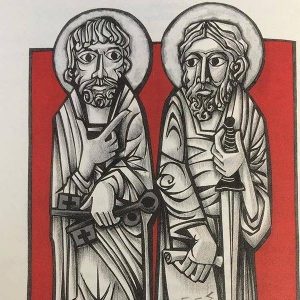 The Holy and Pre-Eminent Apostles Peter and Paul
The Holy and Pre-Eminent Apostles Peter and Paul
Gods’ love, mercy and compassion shine forth most clearly in the feast of these two apostles. Peter was enthusiastic in his faith in Christ, “Peter said to him, ‘Even though I should have to die with you, I will not deny you.’ And all the disciples spoke likewise. (Matthew 26:35)”
When the trial came, however, Peter did deny Christ three times, and all the apostles, except one, ran out of fear. Yet Peter wept for his weakness, and his weakness turned to strength, though not of his own human power, but by the grace of God. For when he confessed Jesus to be the Messiah, the Lord told him: “Simon Peter said … ‘You are the Messiah, the Son of the living God.’ Jesus said to him in reply, ‘Blessed are you, Simon son of Jonah. For flesh and blood has not revealed this to you, but my heavenly Father,’ (Matthew 16:16-17) and it was on this rock of faith that the Church was established. Likewise, Saul closed his eyes to the truth, and persecuted Christians. But even as he was seeking Christians to persecute, the grace of God transformed his life, “On his journey, as he was nearing Damascus, a light from the sky suddenly flashed around him. He fell to the ground and heard a voice saying to him, “Saul, Saul, why are you persecuting me?” He said, “Who are you, sir?” The reply came, “I am Jesus, whom you are persecuting. Now get up and go into the city and you will be told what you must do. (Acts 9:3-6)” It is the great Apostle Paul who later tells us: “[The Lord] said to me, ‘My grace is sufficient for you, for power is made perfect in weakness.’ I will rather boast most gladly of my weaknesses, in order that the power of Christ may dwell with me. (2 Corinthians 12:9)”
This is Christian faith: in weakness there is strength, in foolishness there is wisdom, in death, there is life. This the world does not understand. Today, as we honor these pre-eminent apostles, we, too, pray, “O God of mercy, love and compassion, give me the gift of your Spirit for strength in faith and hope and love, and that I may also show love, forgiveness and compassion to my neighbor.”
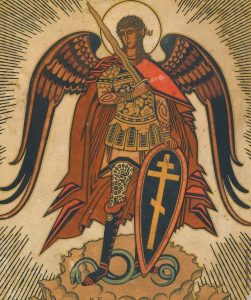 On November 8, the Church has the feast day for St. Michael the Archangel and all holy angels. For the parishioners of this parish, it is “a holy day of obligation.”
On November 8, the Church has the feast day for St. Michael the Archangel and all holy angels. For the parishioners of this parish, it is “a holy day of obligation.”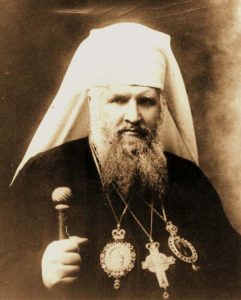 Remembering Metropolitan Andriy Sheptytsky, OSBM, today.
Remembering Metropolitan Andriy Sheptytsky, OSBM, today.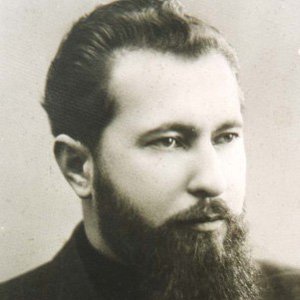 Blessed Theodore Romzha was bishop of the Ruthenian Catholic Eparchy of Mukachevo from 1944 to 1947.
Blessed Theodore Romzha was bishop of the Ruthenian Catholic Eparchy of Mukachevo from 1944 to 1947.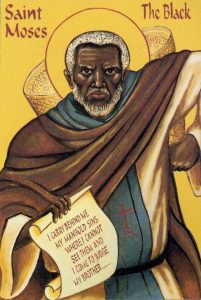 On our liturgical calendar today, the Church remembers a saint many have not heard of, Moses of Skete in Egypt, sometimes called “Moses the black” or “Moses the Ethiopian.”
On our liturgical calendar today, the Church remembers a saint many have not heard of, Moses of Skete in Egypt, sometimes called “Moses the black” or “Moses the Ethiopian.”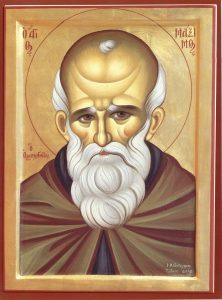 August 13 is the feast-day of St. Maximus. Because it is also the leave-taking of the Feast of the Transfiguration of our Lord, the liturgical commemoration is transferred to Saturday. Today Maximus is considered one of the “pillars of Orthodoxy,” and Fr. John Meyendorff called him “the father of Byzantine theology.” His accomplishments are many – he was martyred because of his faithful defense of the incarnation of our Lord, that he was truly human in every way (except sin) and had a human will. He had to live many years in exile.
August 13 is the feast-day of St. Maximus. Because it is also the leave-taking of the Feast of the Transfiguration of our Lord, the liturgical commemoration is transferred to Saturday. Today Maximus is considered one of the “pillars of Orthodoxy,” and Fr. John Meyendorff called him “the father of Byzantine theology.” His accomplishments are many – he was martyred because of his faithful defense of the incarnation of our Lord, that he was truly human in every way (except sin) and had a human will. He had to live many years in exile.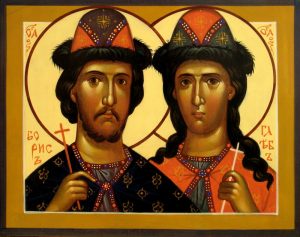 Today, the Byzantine Church commemorates the holy protomartyrs of the Kievan-Rus’, Boris and Gleb, in baptism named Roman and David. They sit in opposition to the common approach to leadership and power among people.
Today, the Byzantine Church commemorates the holy protomartyrs of the Kievan-Rus’, Boris and Gleb, in baptism named Roman and David. They sit in opposition to the common approach to leadership and power among people.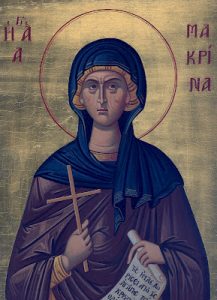 The image of God was truly preserved in you, O Mother, For you took up the Cross and followed Christ. By so doing, you taught us to disregard the flesh, for it passes away, But to care instead for the soul, since it is immortal. Therefore your spirit, O Holy Mother Macrina, rejoices with the Angels! (Trop. 8)
The image of God was truly preserved in you, O Mother, For you took up the Cross and followed Christ. By so doing, you taught us to disregard the flesh, for it passes away, But to care instead for the soul, since it is immortal. Therefore your spirit, O Holy Mother Macrina, rejoices with the Angels! (Trop. 8)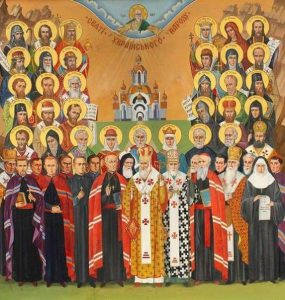
 The Holy and Pre-Eminent Apostles Peter and Paul
The Holy and Pre-Eminent Apostles Peter and Paul